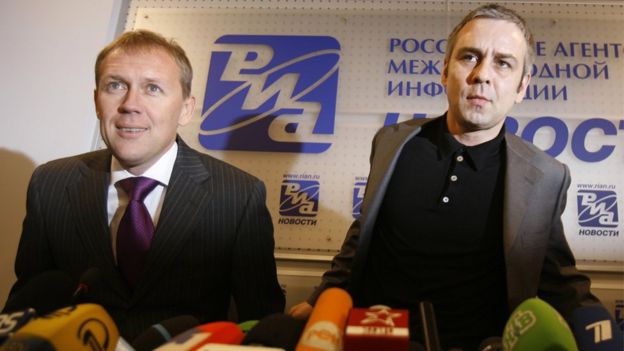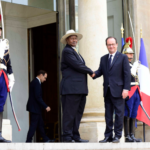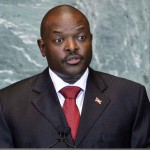The murder of ex-Russian spy Alexander Litvinenko in 2006 in the UK was “probably” approved by President Vladimir Putin, a public inquiry finds.
Mr Putin is likely to have signed off the poisoning of Mr Litvinenko with polonium-210 in part due to personal “antagonism” between the pair, it said.
Mr Litvinenko’s widow Marina welcomed the report, calling for a travel ban on Mr Putin and sanctions on Russia.
The Russian Foreign Ministry said the inquiry had been “politicised”.
It said: “We regret that the purely criminal case was politicised and overshadowed the general atmosphere of bilateral relations.”
It said the inquiry had “not been transparent”, saying it had not expected the process to be unbiased.
Mr Litvinenko died aged 43 in London in 2006, days after being poisoned with the radioactive substance. He was a former Russian spy but fled to Britain where he became a fierce critic of the Kremlin.
Gordon Corera, BBC security correspondent, said there were “audible gasps” inside the court when the conclusion of the report was revealed, adding it had been “stronger than expected”.
Speaking outside London’s High Court, Mrs Litvinenko said: “The words my husband spoke on his deathbed when he accused Mr Putin have been proved by an English court.”
In a statement, Mrs Litvinenko urged the UK government to expel all Russian intelligence operatives and impose economic sanctions on Moscow.
A Downing Street spokeswoman said the report’s conclusions were “extremely disturbing”, saying: “It is not the way for any state, let alone a permanent member of the UN Security Council, to behave.”
Measures taken against Russia in 2007 – including the expulsion of diplomats – remained in place, she said, adding: “We are considering what further action we should take.”
Litvinenko inquiry reaction: Latest updates
Long road to the truth for Litvinenko family
Two Russian men, Andrei Lugovoi and Dmitry Kovtun, deliberately poisoned Mr Litvinenko, the report said. They both deny killing him.
Sir Robert said the two suspects were probably acting under the direction of Moscow’s FSB intelligence service.
Singling out then-FSB chief Nikolai Patrushev, alongside Mr Putin, Sir Robert wrote in the 300 page report: “Taking full account of all the evidence and analysis available to me I find that the FSB operation to kill Litvinenko was probably approved by Mr Patrushev and also by President Putin.”
Responding to the report, Mr Lugovoi, who is now a politician in Russia, said the accusations against him were “absurd”, the Russian news agency Interfax was quoted as saying.
“As we expected, there were no surprises,” he said.
“The results of the investigation made public today yet again confirm London’s anti-Russian position, its blinkeredness and the unwillingness of the English to establish the true reason of Litvinenko’s death.”
Mr Kovtun, now a businessman in Russia, said he would not comment on the report until he got more information about its contents, Interfax reported.
London’s Metropolitan Police said the investigation into the “cold and calculated murder” remained ongoing.
Motives for action
Publishing his long-awaited report, Sir Robert said he was “sure” Mr Litvinenko’s murder had been carried out by Mr Lugovoy and Mr Kovtun.
Both are wanted in the UK for questioning, but Russia has refused to extradite them.
Sir Robert said Mr Litvinenko’s work for British intelligence agencies, his criticism of the FSB and Mr Putin, and his association with other Russian dissidents were possible motives for his killing.
There was “undoubtedly a personal dimension to the antagonism” between Mr Putin and Mr Litvinenko, he added.
“I am satisfied that in general terms, members of the Putin administration, including the president himself and the FSB, had motives for taking action against Litvinenko, including killing him, in late 2006,” Sir Robert wrote.
The use of polonium 210 was “at the very least a strong indicator of state involvement” as it had to be made in a nuclear reactor, the report said.
The inquiry heard evidence that Mr Litvinenko may have been consigned to a slow death from radiation to “send a message”.
- 23 Nov 2006 – Mr Litvinenko dies three weeks after having tea with former agents Andrei Lugovoi and Dmitri Kovtun in London
- 22 May 2007 – Britain’s director of public prosecutions decides Mr Lugovoi should be charged with his murder
- 5 Jul 2007 – Russia refuses to extradite Mr Lugovoi, saying its constitution does not allow it
- May-July 2013 – The inquest into Mr Litvinenko’s death is delayed as the coroner decides a public inquiry would be preferable – but ministers rule out the request
- 11 Feb 2014 – High Court rules the Home Office was wrong to rule out an inquiry before the outcome of an inquest
- January 2015 – Public inquiry begins







